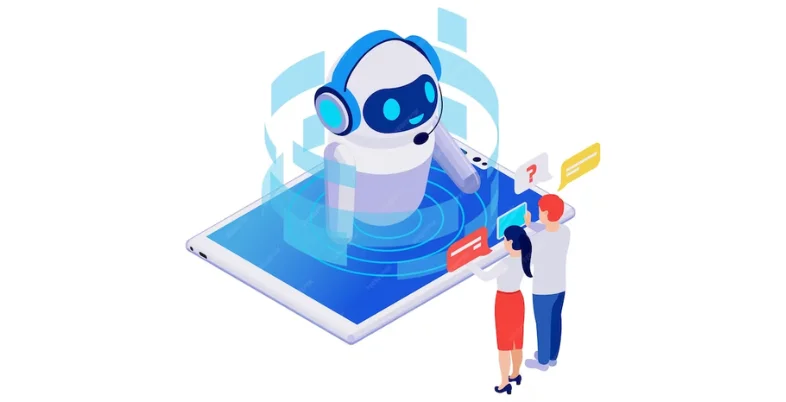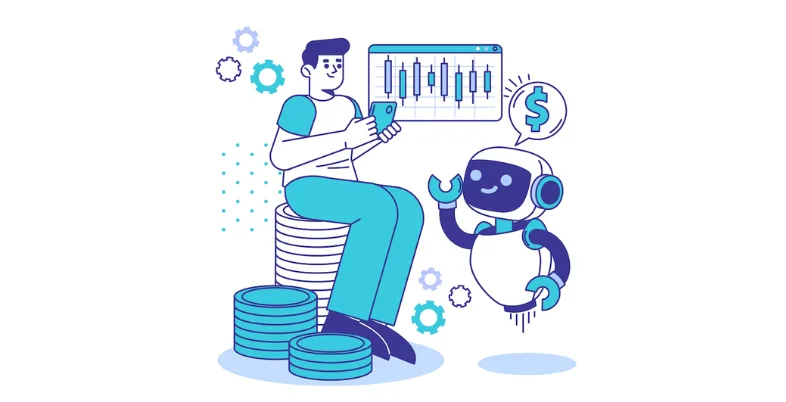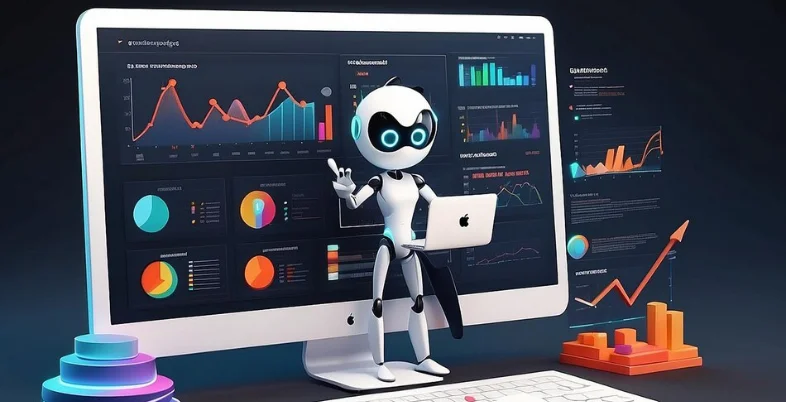In today’s fast-moving digital world, artificial intelligence (AI) is more than just a trendy term—it’s a powerful tool that’s changing how we do business and making companies more profitable.
As AI technology gets better, it creates many opportunities for entrepreneurs and businesses to improve how they operate and offer new, innovative solutions.
AI can make tasks easier, enhance customer experiences, and open up new ways to make money. Whether you’re an experienced business owner or just starting out, looking into AI business ideas can lead to success and help you become a leader in your industry.
Explore these exciting AI business ideas that can boost profits and transform our everyday lives and work.
Importance of AI Business and Why is it Profitable?
As we look at the world of AI businesses, it’s clear that AI is no longer just a future idea but a current reality that’s changing many industries and creating new ways of doing things. From healthcare and farming to marketing and education, AI shows its huge potential to bring new ideas, improve efficiency, and solve complex problems.
1. AI as an Innovation Driver: AI-based businesses are leading the way in creating new solutions that once seemed impossible. They are pushing the limits in every field, showing us new possibilities.
2. Customization and Personalization: One of AI’s greatest strengths is its ability to tailor experiences to individual needs. Whether it’s in marketing, education, or healthcare, AI’s ability to personalize is changing how we experience services.
3. Predictive Power: AI can predict trends and outcomes, which is incredibly valuable. From forecasting market trends to predicting healthy results, AI helps businesses and people make better decisions.
4. Efficiency and Automation: AI is great at automating routine tasks, freeing up humans to focus on creative and strategic work. This shift leads to higher productivity and more innovation.
5. Adapting to Market Needs: AI-based businesses are good at adjusting to changing market conditions. Their ability to quickly respond to consumer behavior and preferences makes them stand out in a fast-changing business world.
6. Ethical Considerations and Challenges: As AI continues to grow, it’s important to address ethical issues like privacy and the need for regulation. Businesses need to handle these responsibly.
7. Future Prospects: The future for AI-based businesses is very bright. With ongoing advancements in AI technology, we can expect these businesses to continue evolving and opening up new opportunities.
Suggested Read: Best Programming Language for AI
Top Profitable AI Business Ideas
1. AI-Powered Healthcare Solutions

Developing AI systems for healthcare can help in diagnosing diseases, personalizing treatment plans, and predicting patient outcomes. AI can analyze medical data, such as X-rays or MRIs, more quickly and accurately than human doctors.
Why Profitable?
Healthcare is a massive industry, and improving patient care and reducing costs can lead to significant financial returns.
How It Works?
– AI systems analyze medical images (like X-rays and MRIs) to detect diseases.
– They predict patient outcomes based on health data and history.
– Personalized treatment plans are created using AI to cater to individual patient needs.
– AI can help in drug discovery by identifying potential new medications.
– It assists in managing hospital operations, like scheduling and resource allocation.
Impact –
– Improved Diagnosis: AI can detect diseases early and more accurately, leading to better patient outcomes.
– Personalized Treatment: Patients receive customized care plans that are more effective for their specific conditions.
– Efficiency: Hospitals and clinics run more smoothly with AI managing schedules and resources.
– Cost Reduction: By automating tasks and improving accuracy, healthcare costs are reduced.
– Innovation: Accelerates drug discovery and development of new treatments.
2. AI-Driven Customer Service

Creating AI chatbots and virtual assistants to handle customer service inquiries. These systems can answer questions, solve problems, and provide support 24/7 without human intervention.
Why Profitable?
Businesses save money on staffing and improve customer satisfaction by offering quick and efficient service.
How It Works?
– AI chatbots answer customer questions through text or voice.
– They handle common inquiries and problems without human help.
– The system learns from past interactions to improve responses.
– AI can escalate complex issues to human agents when needed.
– Provides 24/7 customer support, ensuring round-the-clock service.
Impact –
– Enhanced Customer Satisfaction: Quick and accurate responses improve customer experience.
– Cost Savings: Reduces the need for large customer service teams.
– 24/7 Availability: Customers can get help anytime, increasing convenience.
– Consistent Service: AI provides uniform answers, reducing human error.
– Scalability: Easily handles increased customer interactions as a business grows.
3. AI in Financial Services

Using AI to analyze market trends, manage risks, detect fraud, and provide financial advice. AI can process vast amounts of data to identify patterns and make predictions that humans might miss.
Why Profitable?
Financial institutions can make more informed decisions, reduce losses from fraud, and offer better services to their clients.
How It Works?
– AI analyzes market trends to make investment recommendations.
– It detects unusual transactions to prevent fraud.
– AI tools can manage financial portfolios by balancing risk and reward.
– Predicts market changes to help in strategic planning.
– Personalizes financial advice based on individual client data.
Impact –
– Better Investment Decisions: AI analyzes vast data to offer smart investment advice.
– Fraud Prevention: Identifies suspicious activities, protecting clients and banks.
– Personalized Services: Tailors financial advice to individual needs, improving client satisfaction.
– Efficiency: Automates routine tasks, allowing human workers to focus on complex issues.
– Risk Management: Predicts market fluctuations, helping institutions mitigate risks.
4. AI-Enhanced Marketing

Developing AI tools to analyze consumer behavior, optimize advertising campaigns, and personalize marketing efforts. AI can target the right audience with the right message at the right time.
Why Profitable?
More effective marketing leads to higher sales and better returns on investment for businesses.
How It Works?
– AI analyzes consumer data to understand buying habits.
– It optimizes advertising campaigns for better reach and impact.
– Personalizes marketing messages to target specific audiences.
– Tracks and measures campaign performance in real-time.
– Recommends the best channels and times for ads.
Impact –
– Targeted Advertising: Reaches the right audience, increasing ad effectiveness.
– Cost Efficiency: Optimizes ad spending by focusing on high-potential customers.
– Personalized Experience: Customers receive relevant and engaging content.
– Real-Time Insights: Immediate feedback on campaign performance allows quick adjustments.
– Higher ROI: Better targeting and personalization lead to improved sales and profits.
5. AI for E-commerce

Implementing AI in online retail to recommend products, manage inventory, and improve user experience. AI can personalize shopping experiences and streamline operations.
Why Profitable?
Enhanced shopping experiences can boost sales and customer loyalty, while efficient inventory management reduces costs.
How It Works?
– AI recommends products to customers based on their browsing history.
– Manages inventory by predicting stock needs.
– Enhances the shopping experience with personalized suggestions.
– Analyzes sales data to identify trends and optimize pricing and invoices.
– Improves website search functionality, making it easier to find products.
Impact –
– Improved Shopping Experience: Personalized recommendations make shopping easier and more enjoyable.
– Increased Sales: Relevant suggestions encourage more purchases.
– Efficient Inventory Management: Reduces stockouts and overstock, saving costs.
– Customer Retention: Satisfied customers are more likely to return.
– Operational Efficiency: Streamlines backend operations, reducing manual work.
6. AI-Based Cybersecurity

Creating AI systems to detect and prevent cyber threats. AI can monitor network traffic, identify suspicious activities, and respond to security breaches in real-time.
Why Profitable?
Protecting data and systems from cyber attacks is crucial for all businesses, and AI provides an advanced level of security.
How It Works?
– AI monitors network traffic for unusual activity.
– Detects and responds to potential security threats in real-time.
– Analyzes patterns to predict and prevent future attacks.
– Automates routine security tasks, freeing up human experts.
– Enhances data encryption and protection methods.
Impact –
– Enhanced Security: Real-time threat detection and response protect sensitive data.
– Cost Savings: Prevents costly data breaches and cyber attacks.
– Proactive Defense: Predicts and mitigates potential threats before they occur.
– Reduced Workload: Automates routine security tasks, allowing experts to focus on complex issues.
– Trust Building: Strong security measures build trust with customers and partners.
7. AI in Education

Developing AI tutors, personalized learning platforms, and automated grading systems. AI can provide tailored educational content and track student progress.
Why Profitable?
Personalized education improves learning outcomes, and automated systems reduce the workload for educators.
How It Works?
– AI tutors provide personalized learning experiences.
– Tracks student progress and adjusts the curriculum accordingly.
– Automates grading and feedback for assignments.
– Offers interactive learning tools, like quizzes and simulations.
– Helps identify students who need additional support.
Impact –
– Personalized Learning: Tailors education to individual student needs, improving outcomes.
– Increased Engagement: Interactive tools make learning more engaging and fun.
– Efficient Administration: Automates grading and administrative tasks, freeing up educators’ time.
– Accessibility: Provides education resources to a wider audience, including remote learners.
– Early Intervention: Identifies struggling students early, allowing for timely support.
8. AI for Logistics and Supply Chain Management

Using AI to optimize logistics and supply chain operations. AI can forecast demand, manage inventory, and streamline transportation routes.
Why Profitable?
Efficient supply chain management reduces costs and improves delivery times, which enhances customer satisfaction.
How It Works?
– Predicts demand to optimize inventory levels.
– Plans efficient transportation routes to reduce delivery times.
– Monitors supply chain activities in real-time.
– Identifies potential disruptions and suggests solutions.
– Automates warehouse operations, improving efficiency.
Impact –
– Optimized Operations: Reduces costs and improves delivery times through better planning.
– Increased Efficiency: Automates routine tasks, enhancing productivity.
– Demand Forecasting: Helps businesses prepare for market changes, reducing waste.
– Customer Satisfaction: Timely deliveries and reliable service improve customer experiences.
– Resilience: Quickly identifies and mitigates disruptions in the supply chain.
9. AI in Real Estate

Creating AI tools for property valuation , predictive analytics for market trends, and virtual property tours. AI can analyze data to determine property values and identify investment opportunities.
Why Profitable?
Accurate property valuations and market predictions help real estate professionals make better investment decisions.
How It Works?
– Analyzes property data to provide accurate valuations.
– Predicts market trends to identify investment opportunities.
– Offers virtual property tours using AI-generated images and videos.
– Matches buyers with properties based on preferences and data.
– Automates administrative tasks like paperwork and scheduling.
Impact –
– Accurate Valuations: Provides precise property values, helping buyers and sellers make informed decisions.
– Market Insights: Predicts trends, allowing investors to capitalize on opportunities.
– Virtual Tours: Makes property viewing convenient and accessible from anywhere.
– Streamlined Transactions: Automates paperwork and scheduling, speeding up the buying process.
– Customer Matching: Connects buyers with properties that fit their needs, improving satisfaction.
10. AI for Content Creation

Developing AI tools to generate content, such as articles, social media posts, and even videos. AI can help with content planning, creation, and optimization.
Why Profitable?
Businesses can produce high-quality content at scale, saving time and resources while engaging their audience effectively.
How It Works?
– AI generates text for articles, social media posts, and marketing content.
– Suggests content topics based on trending data and audience interest.
– Optimizes content for SEO to improve search engine rankings.
– Creates videos and graphics using AI design tools.
– Analyzes content performance to refine future creations.
Impact –
– Content at Scale: Produces large amounts of high-quality content quickly.
– Cost-Effective: Reduces the need for large content teams, saving money.
– SEO Optimization: Improves search engine rankings, increasing visibility.
– Engaging Content: Creates personalized and relevant content for audiences.
– Performance Tracking: Analyzes how content performs, informing future strategies.
Final Thoughts
Today, AI business ideas are some of the best opportunities for making money and driving innovation. AI, or artificial intelligence, is changing the way we do things in many industries. From improving healthcare with early disease detection and personalized treatments to making customer service better with smart chatbots, the possibilities are endless.
AI’s ability to customize experiences, predict trends, increase efficiency, and adapt to changes makes it a powerful tool for businesses. As AI technology continues to improve, the potential for new uses and higher profits grows.
AI can handle routine tasks automatically, freeing up people to focus on creative and important work. This boosts productivity and leads to amazing new ideas. AI-based businesses can quickly respond to market changes and customer needs, keeping them competitive.
Although there are important ethical issues and challenges like privacy and regulation, the future for AI businesses looks very bright. There are endless opportunities for those ready to use AI to create innovative, efficient, and profitable businesses.
FAQ’s
Q. How to start an AI business?
Start by finding a problem that AI can help solve. Then, research the market to understand your potential customers. Build a team of smart people who know about AI, like developers and data experts. Focus on making a solution that can grow and be creative.
Q. How much does it cost to make an AI business solution?
It’s different for every project. It depends on how hard the problem is, how many people you need to solve it, and what technology you use. You can ask our team for a price estimate for your project.
Q. What should I think about when starting an AI startup?
Think about who will use your solution and why they need it. Make sure you have good data to work with. Keep learning about what’s new in AI. And make sure your team likes to try new things and come up with new ideas.






